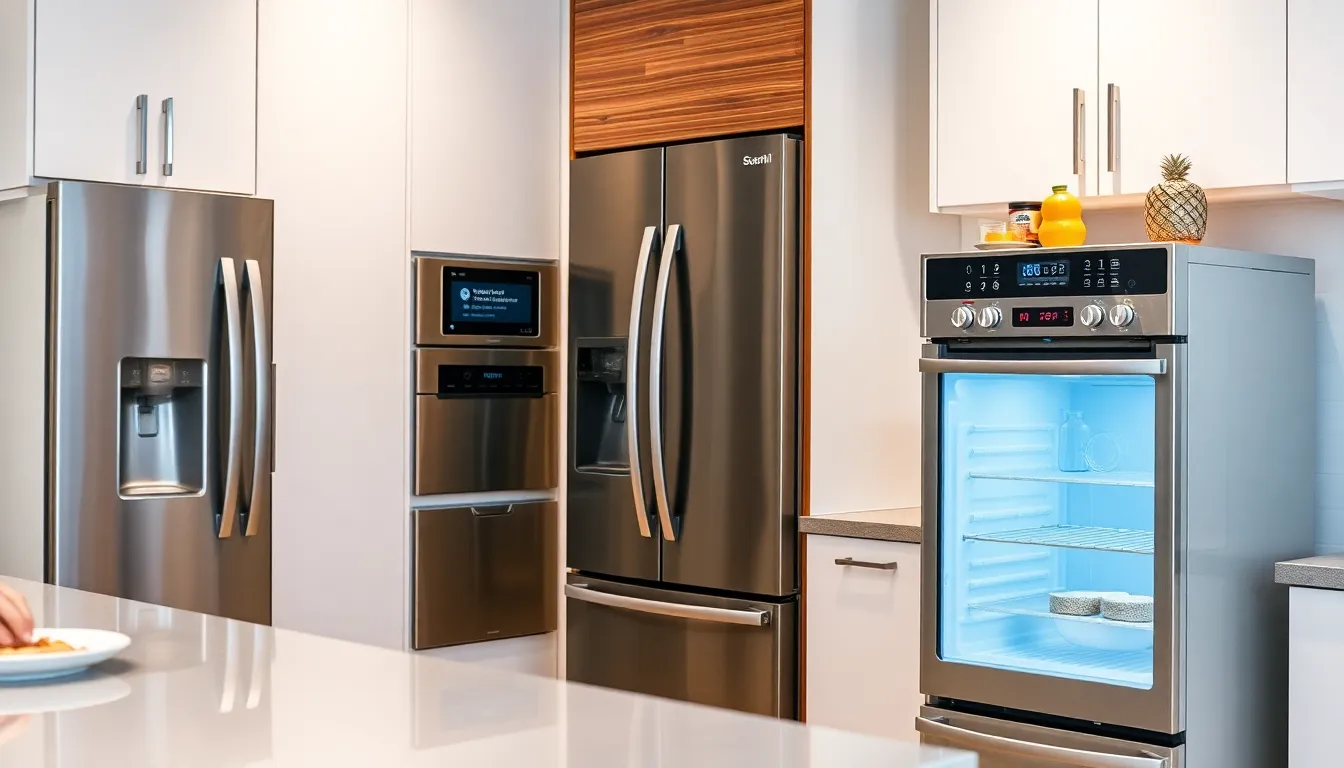In a world where even toasters are getting smart, it’s time to embrace the future of home appliances. Imagine your refrigerator sending you a cheeky reminder that you’re out of milk or your washing machine notifying you that your clothes are ready for a spin—literally! Smart appliance alerts are revolutionizing the way people interact with their homes, making life easier and a whole lot more entertaining.
No more guessing games about whether that leftover takeout is still edible or if the dishwasher’s actually finished its cycle. These nifty notifications keep homeowners in the loop, allowing them to manage their chores with a touch of humor and a dash of convenience. With smart alerts, appliances aren’t just appliances anymore; they’re your quirky, helpful companions in the daily grind. Welcome to the age of appliances that actually care about your well-being—who knew that being responsible could be this much fun?
Table of Contents
ToggleOverview of Smart Appliance Alerts
Smart appliance alerts enhance the experience of managing household tasks. These notifications offer timely reminders that help users keep track of essential activities. For instance, a smart refrigerator can send an alert when grocery items run low. This feature ensures that users know when to replenish supplies.
In addition, washing machines provide notifications when laundry cycles finish. This immediacy allows users to efficiently manage their time without needing to check manually. Other appliances, like ovens, can alert users when dishes finish cooking, promoting perfect meal preparation.
Real-time updates from smart appliances support energy efficiency as well. Dishwashers may notify users about optimal times for running cycles when energy rates are lower. These energy management alerts not only prevent overuse but also save on electricity costs.
Customization plays a significant role in the effectiveness of smart appliance alerts. Users can often adjust the types of notifications they receive according to their preferences. Some may prioritize critical alerts, such as appliance malfunctions, while others may appreciate fun reminders, like when their coffee is ready.
Beyond practicality, these alerts contribute to a more interactive home environment. As smart appliances communicate seamlessly with users, they foster a sense of connection that enhances daily routines. Overall, smart appliance alerts are a crucial feature that transforms household chores into more manageable tasks.
Benefits of Smart Appliance Alerts
Smart appliance alerts significantly enhance user experiences by streamlining household management and fostering greater efficiency. These features lead to a more comfortable and enjoyable living space.
Enhanced Convenience
Convenience stands as a key benefit of smart appliance alerts. They provide timely notifications, ensuring users stay informed about essential tasks. For instance, when a smart refrigerator alerts about low milk, it saves time spent on grocery lists and last-minute trips. Furthermore, a washing machine notification can prompt users to transfer laundry promptly. Smart ovens that notify when meals are ready support seamless meal preparations. Ultimately, these alerts eliminate potential delays and streamline daily chores, transforming how individuals manage their homes.
Energy Efficiency
Smart appliance alerts contribute to improved energy efficiency. Notifications from dishwashers indicate optimal running times, helping users save on electricity costs. Real-time updates on energy usage ensure that appliances operate during off-peak hours, reducing energy bills. Additionally, timely alerts about shutting down appliances when not in use prevent unnecessary energy waste. With these features, smart appliances empower users to make informed decisions, leading to a reduced environmental footprint and lower utility expenses.
Types of Smart Appliance Alerts
Smart appliance alerts vary widely, enhancing user experience and convenience. They ensure users stay informed and engaged with household tasks.
Notifications for Maintenance
Maintenance notifications play a crucial role in appliance longevity. Smart appliances send alerts when filters need cleaning or replacement, ensuring optimal performance. Users receive reminders for routine checks, helping avoid unexpected breakdowns. Some refrigerators notify when to defrost certain compartments, minimizing ice buildup. Scheduled maintenance updates can prevent costly repairs, making household management simpler and more efficient.
Alerts for Malfunctions
Alerts for malfunctions identify issues before they escalate. Washing machines provide notifications when door locks fail or water levels drop unexpectedly. Similarly, ovens can inform users about temperature inconsistencies, preventing cooking mishaps. Dishwashers send updates if drainage problems occur, enabling prompt action. These alerts allow users to address malfunctions quickly, ensuring appliances operate smoothly and maintain optimal efficiency.
Integration with Smart Home Systems
Smart appliances seamlessly integrate with smart home systems, enhancing their functionality and user experience. Through platforms like Amazon Alexa or Google Assistant, users control appliances via voice commands, streamlining interactions. Notifications are synchronized across devices, ensuring users receive alerts on their smartphones, tablets, or smart displays.
Users can set comprehensive routines that trigger multiple appliances simultaneously. For instance, a user might configure a routine where spilling coffee beans leads to the coffee machine brewing automatically and adjusting the oven timer for breakfast. Collaboration between devices increases efficiency and convenience in daily tasks.
Smart home integrations allow for remote monitoring of appliances. Users can check the status of their laundry or see if the refrigerator door is left open while they’re away. This feature provides peace of mind, reducing anxiety over potential issues at home.
Appliances can also learn user preferences over time. A smart thermostat might adjust temperatures based on past behaviors noted by the refrigerator or washing machine usage patterns. Such adaptability ensures households run smoothly, responding to individual needs.
Alerts for maintenance can connect to the broader smart home ecosystem. When a filter needs cleaning or a component requires replacement, notifications appear on users’ smart devices. This proactive approach keeps appliances functioning optimally, preventing unexpected malfunctions.
Advanced customization options allow users to select which alerts receive priority. Critical notifications might prompt immediate attention, while fun reminders can be secondary. Adaptability in notifications enhances the overall smart home ecosystem, tailoring experiences to each user’s lifestyle.
Integrating smart appliances with home systems promotes energy efficiency. Appliances can coordinate schedules to minimize energy usage, allowing users to manage costs effectively. Overall, these integrations transform household management, making daily routines more efficient and enjoyable.
User Experience and Feedback
User feedback highlights the significant impact of smart appliance alerts on daily life. Many individuals appreciate timely notifications that enhance household efficiency. For instance, refrigerators notifying users about low grocery items help avoid last-minute store trips. This convenience contributes to a smoother running household.
Smart washing machines gain praise for sending alerts upon completing laundry cycles. Users frequently express satisfaction with receiving reminders, as it prevents forgotten loads. Additionally, ovens providing notifications when dishes are ready ensure perfectly timed meals, highlighting the seamless cooking experience.
Energy-saving features receive commendation for their practicality. Users often report reduced electricity bills thanks to dishwashers suggesting optimal running times. Smart appliances not only minimize waste but also encourage users to engage with their energy consumption, promoting sustainable habits.
Customization options play a crucial role in user satisfaction. Many appreciate the ability to prioritize alerts according to their needs. Users can choose to receive critical notifications while filtering out less important reminders, tailoring the smart appliance experience to personal preferences.
Integration with smart home systems enhances the overall experience. Feedback frequently emphasizes the ease of managing multiple appliances through platforms like Amazon Alexa or Google Assistant. Voice commands streamline interactions, allowing users to control appliances with minimal effort.
Smart appliances adapt over time, learning user habits and preferences. Regular maintenance alerts contribute positively to appliance longevity, keeping users informed about routine checks. Continuous improvement in their functionality makes daily routines even more manageable.
Overall, strong user experiences indicate that smart appliance alerts foster an interactive and efficient home environment. Notifications transform tasks into easily manageable activities, making household management less burdensome and more enjoyable.
Conclusion
Smart appliance alerts are revolutionizing the way households operate. By turning mundane tasks into engaging experiences they not only enhance convenience but also promote efficiency. Timely notifications help users stay organized and informed allowing them to manage their time better.
The integration of these devices with smart home systems further amplifies their benefits offering seamless control and real-time updates. As users embrace this technology they discover that managing household chores becomes less of a burden and more of an enjoyable routine.
Ultimately smart appliance alerts empower users to create a more interactive and efficient living space making everyday life easier and more enjoyable.







